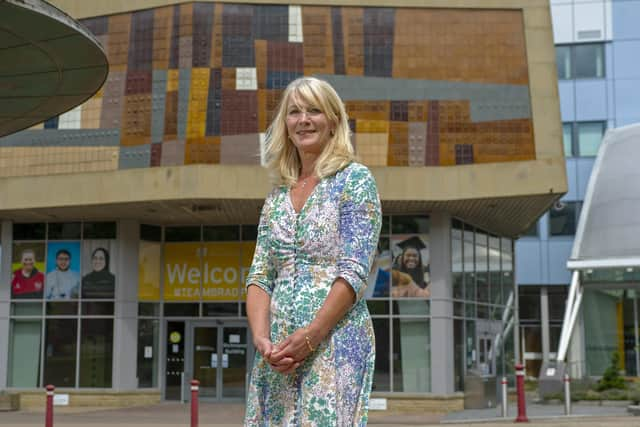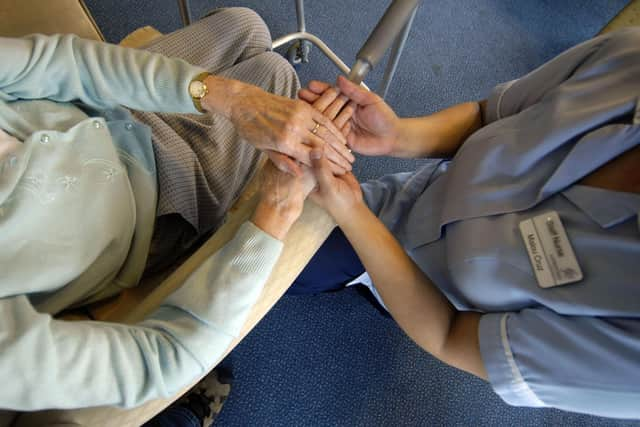How universities can nurse Yorkshire back to health – Shirley Congdon


A timely report by Yorkshire Universities (in partnership with the Yorkshire and the Humber Academic Health Science Network and the NHS Confederation) sets out the scale of health and economic inequalities in the region, and the action required to improve the health and wellbeing of people who live and work here.
Whilst Yorkshire is a region with significant assets and growth potential, it urgently requires greater opportunities and investment to liberate and leverage this potential.
Advertisement
Hide AdAdvertisement
Hide AdUniversities here are working closely with the health and care sector, local authorities, colleges, companies, charities, and communities in response to the public health emergency and its devastating health and financial consequences.


Research being undertaken by universities in Yorkshire is contributing directly to the global efforts to defeat Covid-19.
The UK has a world-class higher education (HE) system, and Yorkshire is home to universities and HE institutions of different types and scale.
Last year, 196,000 students from 120 countries came here to study. HE is a major contributor to the national and regional economy, and it is essential that it remains attractive to domestic and international students and academics.
Advertisement
Hide AdAdvertisement
Hide AdAlongside research and knowledge exchange activities, with a range of businesses, universities have a critical role to play in developing skills and training and retraining individuals, many of whom will have lost their jobs as a direct consequence of the current crisis.


Increasingly, this work involves universities working more closely with other education providers and businesses to drive skills that match the supply and demand trajectories of local and regional labour markets.
Foresight and analysis play an important role here, supporting workforce planning and development in sectors such as health and social care.
Yorkshire urgently needs a more flexible approach and our post-Covid-19 skills, apprenticeships and technical education system must address current and future economic and societal priorities.
Advertisement
Hide AdAdvertisement
Hide AdWhilst complex new issues have arisen during the last few months, the challenges facing the economy and society pre-pandemic remain.
Moving towards a net-zero carbon economy and tackling air pollution and environmental degradation is more pressing than ever.
The new devolution agreements in Yorkshire are welcome and should provide the basis for greater autonomy to address issues that are of direct concern to the region.
For example, in nursing, a profession I know well, the UK has profound skills shortages. In 2020, the Royal College of Nursing identified 40,000 nurse vacancies in England. Furthermore, one in three nurses are due to retire in the next decade.
Advertisement
Hide AdAdvertisement
Hide AdSkills shortages in social care, and also the need to raise the skills levels of the social care workforce, are gaining prominence. Universities in Yorkshire will play a critical role in addressing these shortages.
Working in partnership with the health and care sector, Further Education (FE) colleges and others, Yorkshire Universities will enable better planning and prediction of labour demand in our health and care system.
Applications to universities for September 2020-21 are higher than last year, which is positive. We know that more people want to participate in education and learning and acquire new skills, especially at a higher level, and to do so in different ways.
Universities in Yorkshire are adapting to these changes by offering more inclusive, flexible and wide ranging learning opportunities covering a breadth of academic, vocational and technical subjects and courses.
Advertisement
Hide AdAdvertisement
Hide AdAs the new Chair of Yorkshire Universities, my key priority will be to ensure that the impact of our universities and their role is not only communicated but understood and crucially sought after.
Universities have enviable portfolios of expertise that matter for social inclusion, for growth, for creating sustainable societies, and for improving health and well-being.
It is by working in regional collaborations that universities will be more impactful.
Professor Shirley Congdon is Vice-Chancellor of the University of Bradford and Chair of Yorkshire Universities.
Advertisement
Hide AdAdvertisement
Hide AdEditor’s note: first and foremost - and rarely have I written down these words with more sincerity - I hope this finds you well.
Almost certainly you are here because you value the quality and the integrity of the journalism produced by The Yorkshire Post’s journalists - almost all of which live alongside you in Yorkshire, spending the wages they earn with Yorkshire businesses - who last year took this title to the industry watchdog’s Most Trusted Newspaper in Britain accolade.
And that is why I must make an urgent request of you: as advertising revenue declines, your support becomes evermore crucial to the maintenance of the journalistic standards expected of The Yorkshire Post. If you can, safely, please buy a paper or take up a subscription. We want to continue to make you proud of Yorkshire’s National Newspaper but we are going to need your help.
Postal subscription copies can be ordered by calling 0330 4030066 or by emailing [email protected]. Vouchers, to be exchanged at retail sales outlets - our newsagents need you, too - can be subscribed to by contacting subscriptions on 0330 1235950 or by visiting www.localsubsplus.co.uk where you should select The Yorkshire Post from the list of titles available.
Advertisement
Hide AdAdvertisement
Hide AdIf you want to help right now, download our tablet app from the App / Play Stores. Every contribution you make helps to provide this county with the best regional journalism in the country.
Sincerely. Thank you.
James Mitchinson
Editor
Comment Guidelines
National World encourages reader discussion on our stories. User feedback, insights and back-and-forth exchanges add a rich layer of context to reporting. Please review our Community Guidelines before commenting.